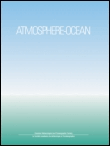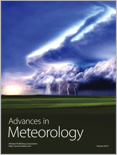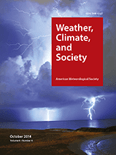
Weather and Climate
Scope & Guideline
Bridging Research and Policy for Climate Action
Introduction
Aims and Scopes
- Atmospheric Science and Weather Systems:
Research focusing on the dynamics of weather patterns, including severe weather events, and their impact on local and regional climates. - Climate Change and Variability:
Investigation into the implications of climate change, including extreme weather phenomena and long-term climate trends, particularly in the context of New Zealand. - Climate Data Analysis and Reanalysis:
Utilization of historical and modern climate data, including reanalysis techniques, to assess and improve understanding of climate systems. - Interdisciplinary Approaches to Weather and Climate:
Integration of various scientific disciplines, such as meteorology, oceanography, and environmental science, to provide comprehensive insights into climate-related issues. - Regional Climate Studies:
Focused studies on the climatic characteristics and specific weather events in New Zealand, contributing to localized understanding and forecasting.
Trending and Emerging
- Extreme Weather Events Analysis:
There is a marked increase in studies examining extreme weather events, particularly in relation to climate change impacts, indicating a critical need for understanding how these events affect local communities and ecosystems. - Ocean-Atmosphere Interactions:
Research exploring the interactions between oceanic conditions and atmospheric phenomena is gaining traction, highlighting the importance of these relationships in climate variability and weather forecasting. - Time Series and Climate Trend Analysis:
A growing emphasis on time series analysis of climatic variables demonstrates a trend towards understanding long-term shifts in climate patterns and their implications for future weather systems. - Innovative Climate Modeling Techniques:
Recent publications are increasingly utilizing advanced modeling techniques and reanalysis data, reflecting a trend towards more sophisticated approaches to simulate and predict weather and climate phenomena. - Impact of Climate Change on Regional Weather Patterns:
Emerging studies are focusing on how global climate change specifically affects regional weather patterns in New Zealand, emphasizing the relevance of localized research in the context of broader environmental changes.
Declining or Waning
- Historical Weather Events:
While historical analyses of weather events such as the 'Superstorm 1950' are still relevant, the focus on isolated historical events appears to be waning in favor of more contemporary analyses and predictive modeling. - General Climate Models without Regional Focus:
There seems to be a decline in the publication of broad climate models that do not specifically address regional or local phenomena, as the journal increasingly emphasizes localized studies relevant to New Zealand. - Basic Meteorological Observations:
Research that merely presents observational data without deeper analysis or contextual insights is becoming less frequent, suggesting a shift towards more complex and integrative studies.
Similar Journals

JOURNAL OF GEOPHYSICAL RESEARCH-ATMOSPHERES
Unraveling the complexities of Earth's atmospheric processes.JOURNAL OF GEOPHYSICAL RESEARCH-ATMOSPHERES, published by the American Geophysical Union, is a leading peer-reviewed journal dedicated to advancing our understanding of atmospheric science and related disciplines. With an impressive impact factor and consistently holding a Q1 ranking across key categories including Atmospheric Science and Geophysics, this esteemed journal caters to a global audience of researchers, professionals, and students eager to explore groundbreaking studies and insights. The journal covers a comprehensive scope of topics, from climate dynamics to atmospheric processes, enhancing knowledge and informing practices within the realm of Earth and Planetary Sciences. With its strong emphasis on quality research, it remains a vital resource for those engaged in unraveling the complexities of our planet’s atmosphere. Explore this journal to stay abreast of significant developments and foster a deeper understanding in this ever-evolving field.

Weather and Climate Dynamics
Championing Open Access to Climate ScienceWeather and Climate Dynamics, an esteemed journal published by COPERNICUS GESELLSCHAFT MBH, focuses on the intricate relationships and processes governing climate and weather patterns, advancing our understanding of atmospheric sciences. Since its launch in 2020, this Open Access journal has rapidly gained recognition, achieving a commendable Q1 status in Atmospheric Science and ranking 39th out of 148 journals in the Earth and Planetary Sciences category, placing it in the 73rd percentile. Based in Germany, the journal aims to provide a platform for innovative research, sharing crucial findings that contribute to tackling global climate challenges. Researchers, professionals, and students alike are encouraged to explore the wealth of knowledge contained within its pages, as it continues to shape the discourse on weather and climate dynamics through rigorous and impactful scholarship.

ATMOSPHERE-OCEAN
Exploring the Depths of Climate ScienceATMOSPHERE-OCEAN is a premier peer-reviewed journal published by Taylor & Francis Ltd, dedicated to advancing the fields of atmospheric science and oceanography. Since its inception in 1963, this journal has served as a crucial platform for researchers, professionals, and students, facilitating the dissemination of significant findings and innovative methodologies in understanding the complex interactions between the atmosphere and the ocean. With its journal ranking in the Q3 category for Atmospheric Science and Q2 for Oceanography as of 2023, along with its Scopus rankings, ATMOSPHERE-OCEAN maintains its relevance by addressing current topics such as climate change, hydrology, and ocean circulation patterns. For those seeking to contribute to or stay informed about the latest research in these critical fields, ATMOSPHERE-OCEAN is an invaluable resource that combines rigorous scholarship with practical implications for environmental management and policy.

Advances in Meteorology
Navigating the Future of Meteorological ScienceAdvances in Meteorology is a renowned open-access journal published by Hindawi Ltd, dedicated to the dynamic field of meteorology and related atmospheric sciences. Since its inception in 2009, this journal has served as a vital platform for researchers and professionals, facilitating the dissemination of cutting-edge research that advances our understanding of atmospheric phenomena. With a commendable impact in the realms of Geophysics, Atmospheric Science, and Environmental Pollution, it boasts impressive Scopus rankings—34th percentile in Geophysics, 54th in Atmospheric Science, and 61st in Environmental Pollution—highlighting its significance and relevance in these critical areas. The journal's commitment to open access ensures that vital research reaches a wide audience, fostering collaboration and innovation within the scientific community. Positioned with a mix of rigorous research and interdisciplinary approaches, Advances in Meteorology continues to shape the landscape of atmospheric science research from its base in Egypt, addressing pressing global challenges related to climate and environment.

Weather Climate and Society
Transforming Perspectives on Climate and CommunityWeather Climate and Society, published by the American Meteorological Society, serves as a leading journal in the interdisciplinary intersection of atmospheric sciences and social sciences. With an ISSN of 1948-8327 and an E-ISSN of 1948-8335, this journal emphasizes the impacts of weather and climate on societal dynamics. Since its inception in 2009, it has gained recognition for its scholarly contributions, achieving a respectable Q3 ranking in Atmospheric Science and Global and Planetary Change, and a notable Q2 ranking in Social Sciences (miscellaneous) as of 2023. Located in the heart of Boston, Massachusetts, the journal is committed to fostering a comprehensive understanding of how climatic factors influence human behavior and decision-making. With access options available for researchers and institutions, Weather Climate and Society is an essential resource for academics and professionals dedicated to exploring the critical interplay between weather, climate, and societal frameworks.

TELLUS SERIES A-DYNAMIC METEOROLOGY AND OCEANOGRAPHY
Elevating Understanding of Dynamic Earth SystemsTELLUS SERIES A-DYNAMIC METEOROLOGY AND OCEANOGRAPHY, published by Stockholm University Press, is a prestigious open-access journal that has been at the forefront of research in the fields of atmospheric science and oceanography since its inception in 1983. With an enduring commitment to disseminating high-quality, peer-reviewed research, the journal has achieved a commendable impact factor, securing its position in the Q2 category for both Atmospheric Science and Oceanography as of 2023. The journal's significant reach is reflected in its Scopus rankings, being positioned at Rank #51 in Oceanography and Rank #77 in Atmospheric Science. With open access established since 2012, TELLUS SERIES A serves not only as a vital resource for researchers and professionals in these dynamic fields but also as an inclusive platform for budding scholars and students. Engaging with this journal allows readers to stay updated on the latest developments and groundbreaking discoveries that advance our understanding of climate systems and marine environments. Its editorial ethos emphasizes the cross-disciplinary integration of atmospheric and oceanographic studies, making it an essential publication for anyone invested in environmental research and policy.

ADVANCES IN ATMOSPHERIC SCIENCES
Exploring New Horizons in Atmospheric DynamicsADVANCES IN ATMOSPHERIC SCIENCES is a highly esteemed journal published by SCIENCE PRESS, dedicated to advancing the field of atmospheric sciences. With an impressive impact factor and ranking as Q1 in Atmospheric Science as of 2023, this journal serves as a leading platform for researchers, professionals, and students to disseminate substantial findings and innovative methodologies across various topics within the atmospheric sciences domain. Established in 1984 and continuously publishing through to 2024, it has successfully positioned itself among the top ranks, currently standing at #17 out of 148 in the Scopus category, highlighting its significance in the field with a remarkable 88th percentile. Although it operates under traditional access, the journal provides invaluable insights into climate dynamics, meteorology, and environmental processes that are crucial for both academic and practical applications. Based in Beijing, China, ADVANCES IN ATMOSPHERIC SCIENCES is committed to fostering a global dialogue and collaboration among scholars and industry experts, making it an essential resource for those invested in understanding and addressing contemporary atmospheric challenges.

Atmosphere-Korea
Pioneering Discoveries in Environmental ScienceAtmosphere-Korea is a prestigious journal published by the Korean Meteorological Society, dedicated to advancing the field of atmospheric sciences. With a focus on both theoretical and applied research, this journal encompasses a wide range of topics including meteorology, climatology, and environmental science, providing a platform for researchers to disseminate their findings and enhance scientific dialogue. Although currently not categorized under an open access model, the journal ensures that all articles meet rigorous scientific standards, thereby maintaining its credibility and academic integrity. The ISSN 1598-3560 and E-ISSN 2288-3266 identify its unique contributions to global knowledge in meteorology. Researchers, professionals, and students alike benefit from the invaluable insights offered through its publications, making Atmosphere-Korea an essential resource in understanding climatic phenomena and their implications for society.

JOURNAL OF THE METEOROLOGICAL SOCIETY OF JAPAN
Exploring the Frontiers of Meteorological ScienceJournal of the Meteorological Society of Japan, ISSN 0026-1165 (E-ISSN 2186-9057), is a leading academic journal published by the Meteorological Society of Japan, dedicated to advancing the field of atmospheric sciences. Established in 1905, the journal has a long-standing tradition of publishing high-quality research that contributes to our understanding of meteorology, climatology, and environmental science. As an Open Access journal since 2018, it ensures wide dissemination of knowledge, allowing researchers, professionals, and students to access cutting-edge studies without barriers. With an impressive impact factor and ranked in the Q1 category in Atmospheric Science, it is recognized for its significant contributions, currently holding a Scopus rank of #36 out of 148 in the field. The journal serves as a vital resource for those involved in meteorological research, policy-making, and education, fostering collaboration and innovation within and beyond Japan.

Asia-Pacific Journal of Atmospheric Sciences
Pioneering Insights for a Sustainable FutureWelcome to the Asia-Pacific Journal of Atmospheric Sciences, a leading publication in the field of atmospheric science, published by the Korean Meteorological Society. With an ISSN of 1976-7633 and an E-ISSN of 1976-7951, this journal has been a cornerstone for researchers and practitioners in the atmospheric sciences since its inception in 2008. Recognized for its rigorous peer-reviewed articles, it holds a commendable Q2 quartile ranking in 2023 and is placed at the 51st rank out of 148 in the Earth and Planetary Sciences, reflecting its impact within the community with a 65th percentile. The journal features a broad scope encompassing meteorology, climatology, and environmental sciences, making it an essential resource for scholars and industry experts alike. As an open access journal, it ensures that groundbreaking research is widely accessible, fostering collaboration and innovation across the Asia-Pacific region and beyond. Explore the latest findings and advancements in atmospheric sciences and contribute to the dynamic field of climate research through the journal's engaging content.